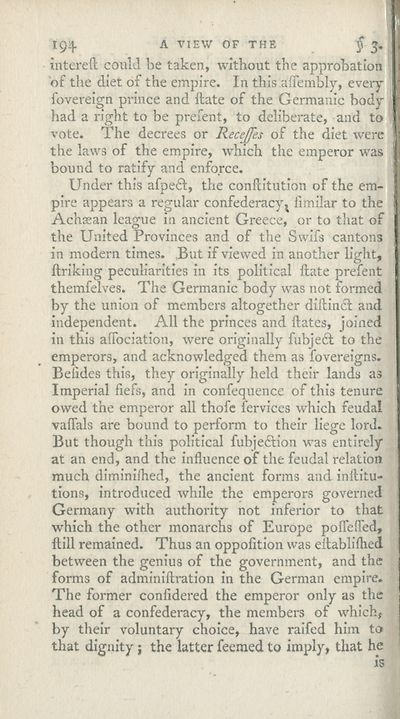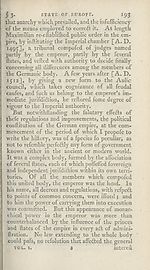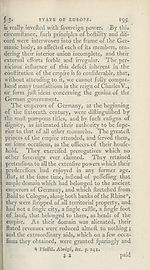Download files
Complete book:
Individual page:
Thumbnail gallery: Grid view | List view

m
A VIEW OF THE
intereft could be taken, without the approbation
of the diet of the empire. In this affembly, every
fovereign prince and ftate of the Germanic body
had a right to be prefent, to deliberate, and to
vote. The decrees or Recedes of the diet were
the laws of the empire, which the emperor was
bound to ratify and enforce.
Under this afpedf, the conflitutlon of the em¬
pire appears a regular confederacy^ fimilar to the
Achsean league in ancient Greece, or to that of
the United Provinces and of the Swifs cantons
in modern times. But if viewed in another light,
ftriking peculiarities in its political ftate prefent
themfelves. The Germanic body was not formed
by the union of members altogether diftinct and
independent. All the princes and ftates, joined
in this affociation, were originally fubject to the
emperors, and acknowledged them as fovereigns.
Belidcs this, they originally held their lands as
Imperial fiefs, and in confequence of this tenure
owed the emperor all thofe fervices which feudal
vaffals are bound to perform to their liege lord.
But though this political fubjeclion was entirely
at an end, and the influence of the feudal relation
much diminilhed, the ancient forms and inftitu-
tions, introduced while the emperors governed
Germany with authority not inferior to that
which the other monarchs of Europe poITeffed,
ftill remained. Thus an oppofttion was eftablifhed
between the genius of the government, and the
forms of adminiftration in the German empire.
The former confidered the emperor only as the
head of a confederacy, the members of which,
by their voluntary choice, have raifed him to
that dignity; the latter feemed to imply, that he
is
A VIEW OF THE
intereft could be taken, without the approbation
of the diet of the empire. In this affembly, every
fovereign prince and ftate of the Germanic body
had a right to be prefent, to deliberate, and to
vote. The decrees or Recedes of the diet were
the laws of the empire, which the emperor was
bound to ratify and enforce.
Under this afpedf, the conflitutlon of the em¬
pire appears a regular confederacy^ fimilar to the
Achsean league in ancient Greece, or to that of
the United Provinces and of the Swifs cantons
in modern times. But if viewed in another light,
ftriking peculiarities in its political ftate prefent
themfelves. The Germanic body was not formed
by the union of members altogether diftinct and
independent. All the princes and ftates, joined
in this affociation, were originally fubject to the
emperors, and acknowledged them as fovereigns.
Belidcs this, they originally held their lands as
Imperial fiefs, and in confequence of this tenure
owed the emperor all thofe fervices which feudal
vaffals are bound to perform to their liege lord.
But though this political fubjeclion was entirely
at an end, and the influence of the feudal relation
much diminilhed, the ancient forms and inftitu-
tions, introduced while the emperors governed
Germany with authority not inferior to that
which the other monarchs of Europe poITeffed,
ftill remained. Thus an oppofttion was eftablifhed
between the genius of the government, and the
forms of adminiftration in the German empire.
The former confidered the emperor only as the
head of a confederacy, the members of which,
by their voluntary choice, have raifed him to
that dignity; the latter feemed to imply, that he
is
Set display mode to:
![]() Universal Viewer |
Universal Viewer | ![]() Mirador |
Large image | Transcription
Mirador |
Large image | Transcription
| Antiquarian books of Scotland > Kings & rulers > History of the reign of the Emperor Charles V. > Volume 1 > (212) |
|---|
| Permanent URL | https://digital.nls.uk/109184875 |
|---|
| Description | By William Robertson. London : Cadell and Davies, 1798. |
|---|---|
| Shelfmark | ABS.1.76.13 |
| Additional NLS resources: | |
| Description | Thousands of printed books from the Antiquarian Books of Scotland collection which dates from 1641 to the 1980s. The collection consists of 14,800 books which were published in Scotland or have a Scottish connection, e.g. through the author, printer or owner. Subjects covered include sport, education, diseases, adventure, occupations, Jacobites, politics and religion. Among the 29 languages represented are English, Gaelic, Italian, French, Russian and Swedish. |
|---|

